SNP’s latest manifesto shows little learning over education - John McLellan


Chapter 12 of Building a New Scotland – you may have missed the previous 11 – is dedicated to education, or so the title would lead you to assume. But Education and lifelong learning in an independent Scotland contains no specific educational measures to improve the average school pupil’s attainment.
Given the SNP has had full control over Scottish schools for 17 years, perhaps it’s wise not to list things they should have done anyway, but it’s intriguing how independence is supposed to transform a system whose independence pre-dates the 1707 Act of Union.
Advertisement
Hide AdAdvertisement
Hide AdInstead, it rehashes arguments about welfare and benefits, and the impact poverty has on attainment. That’s undoubtedly true, but welfare was covered in Chapter Nine (spend billions more we don’t have…) and Chapter Three was dedicated to the economy (Denmark is better off so we’ll be too…).
The only education policy it mentions is getting back into the Erasmus student exchange scheme when an independent Scotland is eventually admitted to the EU, which would not happen overnight.
It has nothing to do with schools, and in my 12 years of university teaching such exchanges only benefit a small fraction of students.
Further, while the SNP is desperate to blacken the UK’s equivalent Turing Scheme, exchanges still happen and the students themselves don’t notice any difference. I know because my son is applying for one.
Advertisement
Hide AdAdvertisement
Hide AdSo, what does the paper offer? What our proposals mean for you contains only three things for Scots; voting rights for 16 and 17 year olds at every election, Erasmus places, and consideration − no guarantee − of parental leave and pay improvements. A fourth “benefit” is granting longer residency rights for international students, which doesn’t affect locals at all.
And that, I’m afraid, is that.
The What our proposals mean for Scotland section has only three elements and one of them is Erasmus. Although tackling child poverty has an effect, it’s not an education measure, and the other is a woolly commitment to children’s rights.
In the section dedicated to the United Nations Convention on the Rights of the Child, education is only mentioned in one paragraph and that points to Article 29, which guarantees an education “which tries to develop your personality and abilities as much as possible and encourages you to respect other people's rights and values and to respect the environment.” It sounds remarkably like Curriculum for Excellence.
“Our schools invest more per pupil than anywhere else in the UK,” claims education secretary Jenny Gilruth in the foreword. “We’ve expanded free school meal provision; we have more teachers per pupil and our teachers are the highest paid anywhere in the UK.”
Advertisement
Hide AdAdvertisement
Hide AdMaybe so, but why then do the international comparisons show Scottish school education continuing to deteriorate, in contrast to the rest of the UK? But there’s always the baby box, which for some reason features prominently.
It really is desperate stuff and, like previous chapters, it serves only to show how little thinking has gone in to refreshing the case for independence, while only drawing attention to the SNP’s track record of failure. So maybe burning of taxpayers’ money on these papers is a worthwhile investment after all.
Comment Guidelines
National World encourages reader discussion on our stories. User feedback, insights and back-and-forth exchanges add a rich layer of context to reporting. Please review our Community Guidelines before commenting.
